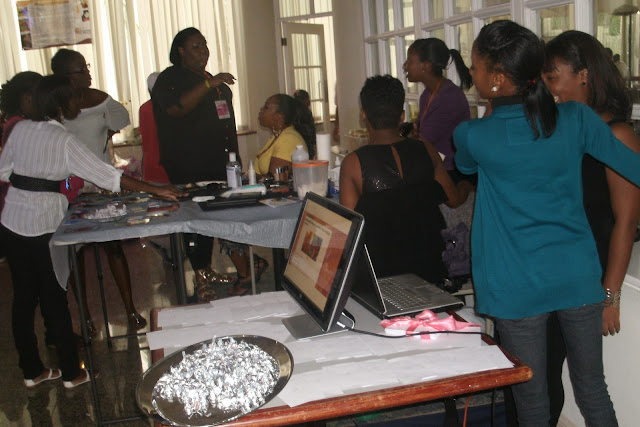As you know, sometimes we touch on some pretty serious topics here on Islandista and this one - a re-post of a piece which appeared on the very popular Clutch Magazine last week (www.clutchmag.com) is definitely one that affects us as Caribbean mothers and daughters. Read it and let me know your thoughts.What do John Lee Malvo and Germaine Lindsay have in common?
The first and most obvious thing is that they were both teenaged mass murderers.
Malvo was 17 years old when he joined John Allen Muhammad in the Beltway sniper attacks which terrorised the Washington D.C area back in 2002.
Lindsay was 19 years old when he blew himself up on a train travelling from King's Cross St. Pancras, killing 26 people, half the victims of the London 7/7 bombings in 2005.
A second, less obvious thing is that both Lindsay and Malvo are Jamaican-born – something that caused Jamaicans no end of shock and chagrin when those tragedies unfolded.
But perhaps the greatest similarity I see between these two is their mothers. By the time they committed their mass killings, both Malvo and Lindsay had been living away from their mothers for a number of years.
Malvo’s mother emigrated from Jamaica to Antigua and then on to the United States, leaving Malvo behind with Muhammad to take her chance in the USA.
Lindsay’s mother had brought him with her to England when she migrated there but then she left him in charge of his younger sisters when he was just 17 years old when she migrated to Grenada with her husband.
This common denominator ties right in with the second – that they are Jamaican. And that this happens a lot in Jamaica. It has become such an ingrained part of the culture that Lindsay’s mother defended her decision to leave her children as being okay because they were ‘supervised’.
It brings to mind something I was moved to write nine years ago, when I was at university in Jamaica:
“It is one of the saddest realities of Jamaican society. It happens everywhere in the Caribbean, but more so in this glorious and tormented island than perhaps anywhere else – in the Anglophone Caribbean, at least. Many of my closest friends have mothers who live ‘a foreign’ in order to make a living that their country cannot offer them. It is one of the most remarkable phenomena of Jamaican society.”
The spur for that was a friend whose mother had been living and working in the United States since my friend was six years old. That year, her mum was coming home in time for Mother’s Day and my usually blasé friend was beside herself at the thought of spending the day with her mother for the first time in 12 years.
It broke my heart but she was not the only one. Off the top of my head I can name many, many Jamaican friends whose mothers live or lived overseas for years at a time.
Jamaica is unusual in that the majority of its migrants are women - up to 55% of all migrants, most of them women of child-bearing age.
Hence ‘barrel children’ has become part of the lingo in Jamaica and Western Union is an integral part of the economy – in fact a popular Western Union ad when I lived in Jamaica showed a mother calling home to make sure her daughter’s school fees had arrived.
It’s not like I don’t understand why. My own father is Jamaican and I was born in Canada. While I wasn’t raised in Jamaica, I lived there for a number of years and I saw for myself the grinding combination of poverty and violent crime that force many Jamaicans to leave.
Sometimes I don’t know which is the greater. Poverty is one thing – there are too many Jamaicans that are desperately poor but truth be told, it is middle-class, educated Jamaicans that are more likely to emigrate.
But the violence … My God … it is the violence – the sheer bloody minded, cold and relentless violence, that tests the resolve and wears down the spirit of even those Jamaicans who swear they will stay. Every time you think the criminals can’t shock you more, they do.
It creates this great conflict that exists in the hearts and minds of all Jamaicans for Jamaica is a Jekyll and Hyde country that can both uplift and depress – as beautiful, vibrant and fascinating as it can be cruel and heartless. Sometimes I think even Jamaicans don’t understand how the same place that can create a Usain Bolt can create a Christopher ‘Dudus’ Coke.
And so Jamaica’s mothers leave and ‘go a foreign’. After it was discovered that one of the Beltway snipers was Jamaican, recriminations flowed in Jamaica.
Malvo’s mother, Una James told NBC she blamed herself too:
“I said yes, I blame myself [in] looking back. I said if I never had left him in Antigua.”
Still the truth is as one sympathetic writer to the Jamaican Star put it:
“Every Jamaican family has a Una James. She is in our lives as our sisters, our friends, our aunts even our mothers, who have made the ultimate choice in seeking to achieve the greater prize of a better life for herself and her child. Una James' decision to rely on others to care for her child is one made daily in Jamaica.”
And so we end up with Malvo and Lindsay and we wonder how differently things would have turned out if they and their mothers had been able to stay in Jamaica.






























